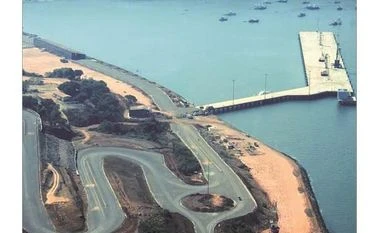Facing stiff competition from the neighbouring Jaigad port of JSW Group, Chowgule-owned Angre Port has chalked out a road map for an assured revenue stream that would give it stronger global identity.
“The plan is to develop Chowgule-owned 280 acres adjoining the port via strategic partners who can establish long-term and sustainable businesses with the port. In this manner, we look to get anchor customers for our port in turn ensuring assured revenue stream,” C P Jayakrishnan, chief executive officer of Angre Port, told Business Standard.
The agri-based port of Angre is a riverine port that currently exports sugar and molasses to the tune of 0.5 million tonne annually.
“We are in talks with several strategic business partners and few are also at closure stage. In fact, we have already got our first anchor customer who has set up an edible oil factory inside the port and would be handling close to 200,000 tonne cargo annually for the company. We aim to fill up the entire 280 acres with industrial units in the next three years,” said Jayakrishnan.
Chowgule will be investing in the strategic business partnership by offering land, power and water to industries along with its port services.
“Land along with waterfront port for transportation is a strong combination which when offered on rental basis is economically viable for the industries. Apart this investment, Chowgule Group is not looking to invest any additional amount in the strategic partnership project,” explained Jayakrishnan.
Since the commercial cargo available in the hinterland is close to 2.5 million tonne and would get divided between Angre Port and the Jaigad Port, Chowgules see the need to have assured revenue stream for its facility.
The JSW Group-owned Jaigad Port, however, currently has more of captive cargo for their –power and steel plants in Maharashtra.
Alongside, the Chowgules are also looking to develop the port as a chemical hub as factories located in the hinterland of the port are currently using JNPT services, which is 350-400 km from factory location as against Angre Port which is only at 100-180 km distance.
“Consultants have been appointed to study the feasibility of making the port a chemical hub,” he said.
Being a riverine port, Angre has draft size limitations and can handle only medium-sized vessels such as handymax vessels. This start-up private port currently has an installed capacity of 3 million tonne.
A total investment of ~1,000 crore has gone into the Angre Port along with the shipyard in the same compound, of which 80-85 per cent has come from the promoter of the port.
Meanwhile, the port has plans to cater to coastal cargo and even add container cargo into its majority bulk handling facility to offer a strong mix to its customers.
Angre is also the first private port to take large cruise vessel services. Though due to the pandemic, the cruise business remains frozen, the port aims to continue to lay thrust on the segment in the long term.
In addition to commercial cargo handling, the port facility will cater to docking and undocking services for captive ship repair yard at Lavgan Dockyard.
“With the shipyard-related vessels, we are compromising on pricing since we have to also make the shipyard viable. This would form about 25-30 per cent of our total revenue stream,” said Jayakrishnan.
Though the promoters have strong plans to make Angre an attractive destination for EXIM cargo, which would give it the much needed global presence, there are currently no plans to grow capacity organically or inorganically.
Unlock 30+ premium stories daily hand-picked by our editors, across devices on browser and app.
Pick your 5 favourite companies, get a daily email with all news updates on them.
Full access to our intuitive epaper - clip, save, share articles from any device; newspaper archives from 2006.
Preferential invites to Business Standard events.
Curated newsletters on markets, personal finance, policy & politics, start-ups, technology, and more.
)